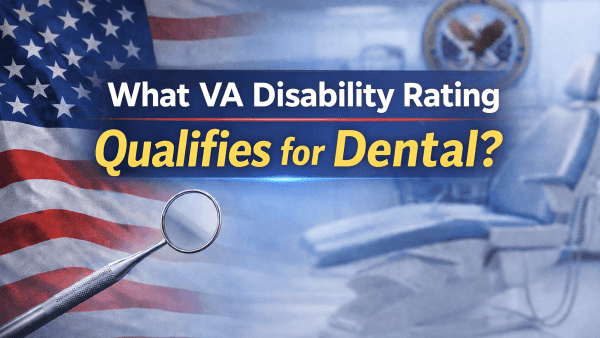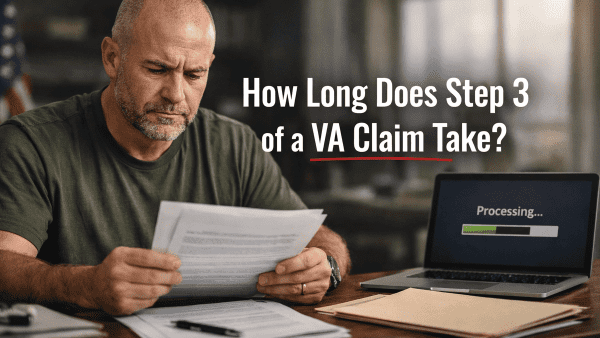Looking for Expert-Level VA Claim Answers?📱Call Us Now! 737-295-2226
Diabetes affects nearly 25% of the VA’s patient population, and eligible veterans deserve a VA rating for diabetes.
This guide details the main types of diabetes, how the VA rates them, and common VA secondary conditions to diabetes.
YOU served, and YOU deserve, so find out what you are entitled to today!
Table of Contents
Determining Eligibility for a VA Rating for Diabetes

Your VA disability rating for diabetes will depend on factors including your blood sugar control, complications related to diabetes, and how it affects your daily life and ability to work.
In addition, you must provide the following information to receive a diabetes VA rating:
- A current diagnosis
- An in-service event, injury, or illness
- A medical nexus (link) between the current diagnosis and the in-service event, injury, or illness.
Diabetes VA Ratings
The VA rates diabetes at 10%, 20%, 40%, 60% and 100%. You can find the diabetes VA rating under 38 CFR 4.119, Diagnostic Code 7913 for diabetes mellitus.
VA Diabetes Rating Chart
| Condition Description | VA Rating |
| Requiring more than one daily injection of insulin, restricted diet, and regulation of activities (avoidance of strenuous occupational and recreational activities) with episodes of ketoacidosis or hypoglycemic reactions requiring at least three hospitalizations per year or weekly visits to a diabetic care provider, plus either progressive loss of weight and strength or complications that would be compensable if separately evaluated | 100% |
| Requiring insulin AND restricted diet AND regulation of activities with episodes of ketoacidosis or hypoglycemic reactions requiring one or two hospitalizations per year or twice a month visits to a diabetic care provider, plus complications that would not be compensable if separately evaluated | 60% |
| Requiring insulin AND restricted diet AND regulation of activities | 40% |
| Requiring insulin and restricted diet, or oral hypoglycemic agent and restricted diet | 20% |
| Manageable by restricted diet only | 10% |
VA Secondary Conditions to Diabetes
The VA defines secondary conditions as a service-connected injury or illness caused by another service-connected illness, injury, or mental health condition.
Frequently, one condition leads to another, and you are entitled to compensation if you can prove a link between the two.
Secondary Conditions to Diabetes
- High blood pressure (Hypertension)
- Kidney dysfunction
- Coronary artery disease
- Stroke
- Heart attack
- Nerve damage
- Erectile dysfunction (ED)
- Diabetic peripheral neuropathy
- Skin conditions
3 Main Types
While other types of diabetes exist, including prediabetes and monogenic diabetes, the three main types of diabetes are Type 1, Type 2, and Gestational Diabetes.
Diabetes, or diabetes Mellitus, affects how your body turns food into energy and results in high blood sugar.
Type 1 Diabetes
Type 1 diabetes is caused by an autoimmune reaction resulting in your pancreas producing little or no insulin and is usually diagnosed in early childhood or adolescence.
You may be eligible for a VA disability rating for Type 1 diabetes if you can prove a link between your condition and military service.
Type 2 Diabetes
Type 2 diabetes, or adult-onset diabetes, evolves over time due to lifestyle factors or genetics.
With Type 2 diabetes, your pancreas isn’t making as much insulin as before, and your body becomes resistant to insulin.
Gestational Diabetes
Women who develop high blood glucose during pregnancy are at risk for gestational diabetes.
While many cases resolve after birth, some women with the condition are at a higher risk of developing Type 2 diabetes.
In 2017, researchers from VA Palo Alto Health Care System and the Stanford University School of Medicine found that a PTSD diagnosis was associated with an increased risk of gestational diabetes and preeclampsia (high blood pressure in pregnancy).
Symptoms
The following are common symptoms of diabetes:
- Blurry vision
- Excessive thirst
- Sores that don’t heal quickly
- Frequent infections
- Weakness and tiredness
- Frequent urination
While there is no cure for diabetes, you can treat it through medication, insulin injections, and a special diet.
Frequently Asked Questions (FAQs)
What is the VA Rating for Type 2 Diabetes?
Ratings for Type 2 diabetes vary between 0% and 100%, depending on the severity of your condition. You can find the VA disability rating for diabetes type 2 under 38 CFR 4.119, Diagnostic Code 7913.
Is Diabetes a Presumptive Condition?
Yes, it can be, and there is an established connection between exposure to Agent Orange and diabetes. If you were exposed to Agent Orange and meet the specific criteria, your diabetes may be considered a presumptive condition. Check out our post, VA Presumptive List Explained, for more information about presumptive conditions and your eligibility.
What is the VA Disability Rating for Diabetic Neuropathy?
The VA rating for diabetic peripheral neuropathy ranges from 10% to 80%, depending on the severity of your condition. Many veterans with diabetes develop some degree of neuropathy, where one or more peripheral nerves have been damaged. Usually, veterans are rated 10-40% for peripheral neuropathy, but the rating could be up to 80% if the symptoms are severe (i.e., complete paralysis).
NEED MORE ASSISTANCE?
Most veterans are underrated for their disabilities and, therefore, not getting the compensation they’re due. At VA Claims Insider, we help you understand and take control of the claims process, so you can get the rating and compensation you’re owed by law.
If you’ve filed your VA disability claim and have been denied or have received a low rating—or you’re unsure how to get started—reach out to us! Take advantage of a VA Claim Discovery Call. Learn what you’ve been missing—so you can FINALLY get the disability rating and compensation you deserve!
Author

Kelly Olone
Kelly Olone is a military spouse who earned her degree in Psychology from Florida International University. After working in the non-profit sector for several years, she turned to her passion for writing. She aims to contribute to a better understanding of the valuable benefits that veterans deserve. As a mom, Kelly navigates the delicate balance between deadlines and bedtime stories with finesse.



